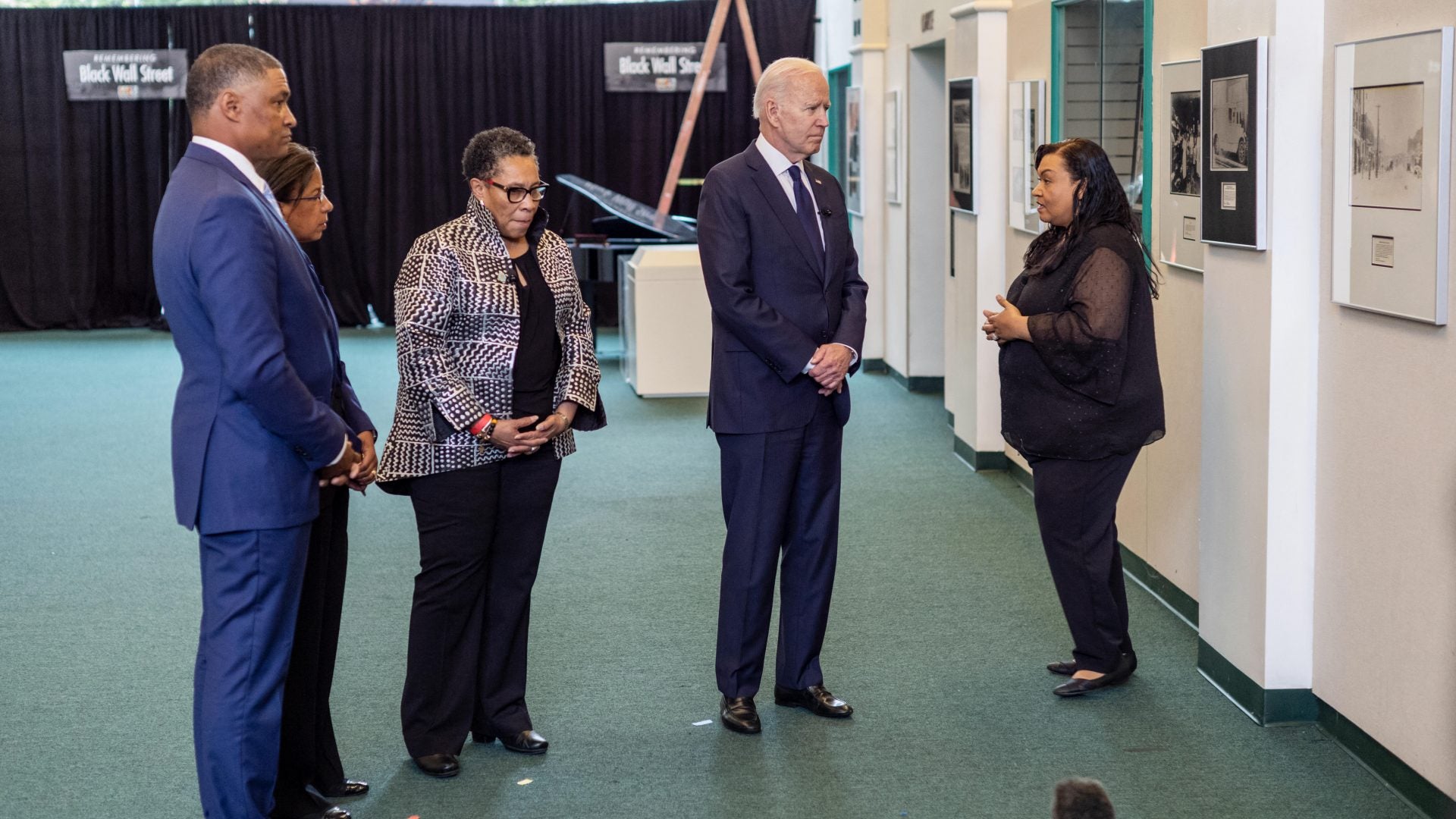
President Joe Biden, some of his cabinet, and members of the Congressional Black Caucus traveled to Oklahoma to commemorate the 100th year since the Tulsa Race Massacre in 1921.
Biden’s visit on Tuesday made him the first sitting U.S. president in history to visit what was widely known as “Black Wall Street.” The once-vibrant, segregated enclave of homes, businesses, churches, schools, and hospitals was situated in the Greenwood district of Tulsa until white vigilantes initiated one of the worst acts of racial violence in American history.
Following allegations of a Black teen assaulting a young white woman, late in the evening of May 31, 1921 and into the next day, June 1, a massive mob looted, burned and razed to the ground about 35-square blocks. While the precise number of those killed isn’t known, experts say anywhere between 75 and 300 people died. More than 1,200 homes were destroyed, and some 9,000 residents were left homeless, many later rounded up and moved to internment camps.
“What happened in Greenwood was an act of hate and domestic terrorism, with a through line that exists today,” said Biden in a speech during his visit.
The president toured the Greenwood Cultural Center, met descendants of the massacre and community leaders, and also greeted survivors. Three centenarians–Viola Fletcher, 107; her brother, Hughes Van Ellis, age 100; and 106-year-old Lessie Benningfield Randle were children when the Greenwood tragedy unfolded. For decades, the massacre was never officially acknowledged.
“But just because history is silent, doesn’t mean it did not take place,” Biden said in his remarks. “And while darkness can hide much, it erases nothing. Some injustices are so heinous, so horrific, so grievous, they can’t be buried, no matter what.”
POTUS was joined by Marcia Fudge, Secretary of the Department of Housing and Urban Development (HUD) and Senior White House Advisors Susan Rice and Cedric Richmond. Members of Congress who traveled to Tulsa included: Reps. Barbara Lee (D-CA), Steven Horsford, Brenda Lawrence (D-MI), Hank Johnson (D-GA), Cori Bush (D-MO), Lisa Blunt Rochester (D-DE), and Sheila Jackson Lee (D-TX). The Congressional Black Caucus members held a digital press conference to commemorate the 100th year.
Among the other attendees of the event: Rev. Jesse Jackson; Rev. Al Sharpton, National Action Network; Rev. Dr. William Barber, the Poor People’s Campaign; Marc Morial, National Urban League; and tribal nation leaders.
“America is in desperate need of a moment of reckoning. The attempts to white wash the atrocity of the Greenwood Massacre from history will not be successful,” said Congresswoman Lee. “We must continue telling this story and never stop.”
Lee has introduced legislation to form a Truth, Racial Healing and Transformation Commission.
She also supports Jackson Lee’s H.R. 40 legislation, which would establish a commission to study and develop reparations proposals for African Americans.
“America’s truth-telling moment is long overdue. It is not enough to dismantle the systemic racism present in everyday life for Black Americans—we must learn from these events and provide restorative justice for communities that have been oppressed for generations,” Lee said in a statement.







The day was not only about remembering vital history. The president announced the Biden-Harris Administration will take new steps to “help narrow the racial wealth gap and reinvest in communities that have been left behind by failed policies,” as per Lee’s statement. The Administration is “expanding access to two key wealth-creators – homeownership and small business ownership – in communities of color and disadvantaged communities,” it continues, noting that the median Black American family has thirteen cents for every one dollar in wealth held by white families.
The Administration has pledged to do the following:
- Take action to address racial discrimination in the housing market, including by launching a first-of-its-kind interagency effort to address inequity in home appraisals, and conducting rulemaking to aggressively combat housing discrimination.
- Use the federal government’s purchasing power to grow federal contracting with small disadvantaged businesses by 50 percent, translating to an additional $100 billion over five years, and helping more Americans realize their entrepreneurial dreams.
- Additionally, the Administration has outlined billions in investment under the president’s $2 trillion “American Jobs Plan” to create infrastructure jobs and build wealth in communities of color. The package is pending before Congress.






